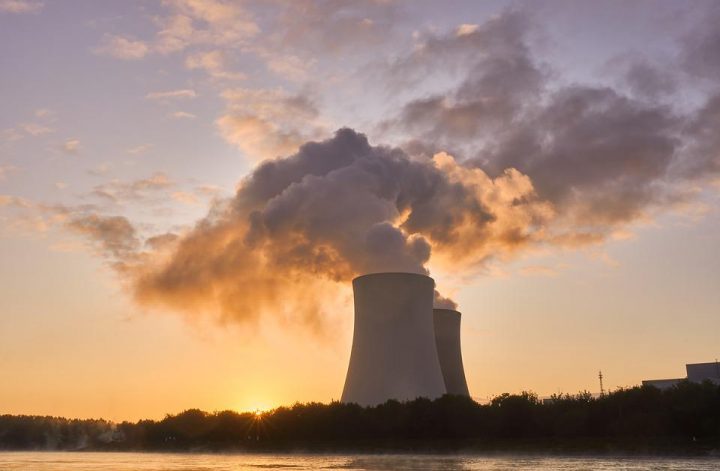Introduction
Nuclear energy is the type of energy produced by a process known as fission. Electricity is generated in several ways such as using solar panels, coal burning, or maybe by capturing the heat from atoms that split apart. If electricity is produced from splitting atoms apart then it is called nuclear energy. Thermal power plants use steam to convert heat into electricity. The heat used to generate steam in nuclear power plants is produced when atoms split apart, a process known as fission. Heat is released when atoms break apart. A chain reaction occurs when the procedure is done again. Uranium is the substance utilized in the fission process in a nuclear power plant. Fission and fusion are the two primary nuclear processes investigated for energy generation.
- Fission is defined as the energetic breaking of big atoms such as Uranium or Plutonium into two smaller atoms known as fission products.
- The fusion of two tiny atoms, such as hydrogen or helium, produces heavier atoms and energy. These processes can provide more energy than fission while emitting fewer radioactive byproducts.
You may also like: Renewable Alternative Energy Resources – Advantages and Disadvantages
Nuclear Energy Applications
-
Generate Electricity:
Fission heat is used to create electricity. In a nuclear power plant, this is performed by splitting uranium within a reactor. The created energy heats the water, which causes turbines to spin. The spinning of the turbines provides electricity similarly to windmill turbines.
-
The nuclear weapon
These bombs produce a massive explosion that can demolish enormous regions in seconds by utilizing both nuclear fission and fusion. Those who survive the initial blast are also exposed to deadly quantities of radiation.
-
Safety of Food
Nuclear energy is also utilized to ensure the safety of our food.
You May also like: What Are Renewable Energy Sources? – Types of Green Energy
-
Exploration of Space
Nuclear energy can be utilized as power generator for deep space exploration.
Advantages of Nuclear Energy
-
The energy that is inexpensive
Although nuclear power facilities are expensive to develop, they provide comparatively inexpensive electricity and have minimal running expenses.
-
Reliable
One of the most significant advantages of nuclear energy is its reliability as a source of power generation.
-
There are no carbon emissions
Nuclear power reactors emit no greenhouse gases. This is a significant benefit over traditional energy sources, like as fossil fuels, which emit massive amounts of carbon dioxide into the environment.
-
It is good for the environment
Nuclear energy is an efficient and ecologically safe source of energy. It emits no greenhouse emissions and may be utilized in a variety of applications.
-
It Is Stable
Nuclear energy is intrinsically stable. This energy source is also cheap, dependable, and efficient.
Also read: Is Transition To Clean Energy Crucial For Our Survival?
Disadvantages Of Nuclear Energy
-
Water intensive
Nuclear power facilities use a lot of water to generate electricity. The United States used 320 billion gallons of water to generate nuclear electricity in 2015. This is more water than is utilized in coal processing.
-
Uranium is a finite resource
Renewable energy sources like the sun and wind have an unlimited supply. Nuclear energy is not a renewable source of energy. Uranium, like other fuel sources, is scarce and only found in a few nations. Uranium is now plentiful but in short supply. There is still the possibility of running out.
-
Poorer countries will be forced to rely on imported energy
Nations that lack the capacity to establish their own nuclear power facilities will be forced to rely on richer and more technologically advanced nations to meet their energy demands. As history has shown, if poorer countries opt to cut costs on safety measures and develop their own nuclear facilities, it will only end in tragedy.
A renewable energy resource is described as a source of energy that is not depleted when consumed or that can be regenerated throughout the lifespan of a human. Solar power is an example of a renewable resource since converting solar energy into useful electricity does not reduce the sun’s power. For more info: What is Solar Energy? – Uses, Advantages, Disadvantages
-
Availability of Fuel
Unlike fossil fuels, which are available to the majority of countries, uranium is an extremely limited resource that occurs in just a few countries. Before anybody can even consider establishing a nuclear power plant, many international bodies must grant permission.
6. Safety concerns:
Although many scientists repeatedly say that Nuclear energy is safe, there have been cases of disastrous nuclear power plant accidents. To learn more, check out: 10 Major Environmental Disasters In The World
Also read: What is Wind Energy? – Uses, Advantages, Disadvantages
Conclusion
Nuclear power is a significant low-carbon-emission energy source for electricity generation across the world, and it is anticipated to stay so for the foreseeable future. However, nuclear power must be safe, dependable, and cost-effective when compared to alternative energy sources.
Also read: The Rise of Solar Energy in Pakistan
We hope you liked this post! Please comment below if you have any suggestions, comments or feedback! We at #envpk love hearing from readers! Thanks



